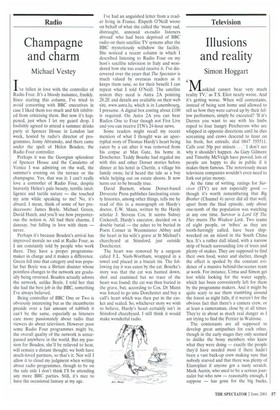Radio
Champagne and charm
Michael Vestey
IVe fallen in love with the controller of Radio Four. It's a bloody nuisance, frankly. Since starting this column, I've tried to avoid consorting with BBC executives in case I liked them too much and felt inhibited from criticising them. But now it's happened, just when I let my guard drop. I foolishly agreed to attend a summer drinks party at Spencer House in London last week, hosted by radio's director of programmes, Jenny Abramsky, and there came under the spell of Helen Boaden, the Radio Four controller.
Perhaps it was the Georgian splendour of Spencer House and the Canaletto of Venice I was admiring on the wall, the summer's evening on the terrace or the champagne. Yes, that was it; I can't really love a controller of Radio Four, despite heavenly Helen's pale beauty, terrific intelligence and tactile nature — she touched my arm while speaking to me! No, it's absurd. I mean, think of some of her predecessors: James Boyle, Michael Green, David Hatch, and you'll see how preposterous the notion is. All had their charms, I daresay, but falling in love with them — never.
Perhaps it's because Boaden's arrival has improved morale no end at Radio Four, as I am constantly told by people who work there. They have a proper programmemaker in charge and it makes a difference. Green fell into that category and was popular but Boyle was a Birtian disaster whose pointless changes to the network are gradually being reversed. Boaden actually adores the network, unlike Boyle. I told her that she had the best job in the BBC, something I've always believed.
Being controller of BBC One or Two is obviously interesting but as the incumbents preside over a fair amount of rubbish it can't be the same, especially as listeners care more passionately about radio than viewers do about television. However poor some Radio Four programmes might be, the overall quality of the network is unsurpassed anywhere in the world. But my passion for Boaden, she'll be relieved to hear, will remain a distant thought; we both have much-loved partners, so that's it. Nor will I allow it to cloud my judgment when writing about radio programmes, though to be on the safe side I don't think I'll be attending any more BBC parties. Still, it's nice to have the occasional fantasy at my age.
I've had an anguished letter from a reader living in France. Elspeth O'Neill wrote on behalf of what she called the 'many sad, distraught, annoyed ex-radio listeners abroad' who had been deprived of BBC radio on their satellite TV systems after the BBC mysteriously withdrew the facility. She noticed a recent column in which I described listening to Radio Four on my host's satellite television in Italy and wondered how she too could receive it. I've discovered over the years that The Spectator is much valued by overseas readers as it keeps them sane, so for their benefit I can repeat what I told O'Neill. The satellite system they need is Astra 2A pointing 28.2E and details are available on their web site, www.astra.lu, which is in Luxembourg, I presume. A digital box costing about £100 is required. On Astra 2A you can hear Radios One to Four though not Five Live and you can receive ITN's 24-hour news.
Some readers might recall my recent mention of what I thought was an apocryphal story of Thomas Hardy's heart being eaten by a cat after it was removed from his corpse at Max Gate, his home in Dorchester. Teddy Bourke had regaled me with this and other Dorset stories before dinner at his hotel in Chettle, a village his family owns; he'd heard the tale as a boy while helping out on estate shoots. It now turns out to be broadly true.
David Burnett, whose Dorset-based Dovecote Press publishes fascinating county histories, among other things, tells me he read of this in a monograph on Hardy's doctor, E.W. Mann, written by the Hardy scholar J. Stevens Cox. It seems Sidney Cockerell, Hardy's executor, decided on a double burial — the ashes to be buried in Poets Corner in Westminster Abbey and the heart in his wife's grave at St Michael's churchyard at Stinsford, just outside Dorchester.
The heart was removed by a surgeon called F.L. Nash-Wortham, wrapped in a towel and placed in a biscuit tin. The following day it was eaten by the cat. Bourke's story was that the cat was hunted down, shot and examined but no trace of the heart was found; the cat was then buried in the grave, but, according to Cox, Dr Mann was forced to go into Dorchester and buy a calf's heart which was then put in the casket and sealed. So, whichever story we wish to believe, Hardy's heart certainly isn't in Stinsford churchyard. I still think it would make wonderful radio,










































































 Previous page
Previous page